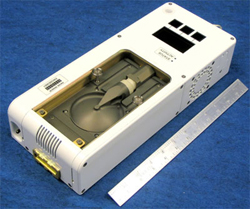Study: NASA’s “electronic nose” can smell out brain cancer cells
 The “electronic nose,” developed by the US space agency NASA (National Aeronautics and Space Administration) for monitoring air quality on Space Shuttle Endeavour, is also capable of smelling out cancer – say US scientists.
The “electronic nose,” developed by the US space agency NASA (National Aeronautics and Space Administration) for monitoring air quality on Space Shuttle Endeavour, is also capable of smelling out cancer – say US scientists.
The neurosurgeons and oncology experts at the City of Hope Cancer Center located in the city of Duarte, California, researchers from the Brain Mapping Foundation in West Hollywood, and scientists at the Jet Propulsion Laboratory (JPL) in Pasadena, have claimed that the “electronic nose” or “ENose” can detect cancerous brain cells.
The boffins have reported that the NASA's ENose is capable of sensing the difference between the odors emitted by healthy cells and smells let out by cancerous cells, and on the basis of that, the ENose can detect cancerous cells. According to researchers, the ENose can be used to nose out brain cancer cells and cancerous cells in other organisms.
In their pilot study, which will appear in July edition of the journal IBMISPS-NeuroImage, the researchers have explained that the NASA's ENose is ultra sensitive device equipped with 32 sensors that can sense the minutest presence of chemicals in air. Originally developed for the International Space Station, the ENose can nose out chemical concentrations in the air around it as low as 1 in 10,000 parts per million. Hence, the ENose can be used to sniff out different metabolic waste products emitted by cancerous versus normal cells.
The Chairman & Scientific Director of the Brain Mapping Foundation and the lead author of the study, Babak Kateb said, "This pilot study lays the groundwork for future research that may help us better understand cellular trafficking, contribute to designing better approaches for the detection and differentiation of brain cancer, and understand the pathophysiology of intracranial gliomas."
According to the researchers, the findings of the study will contribute to the development of highly sensitive cancer detectors, early detection of tumors, and increasing the patient's chances of survival. The findings of the will also be presented at the sixth Annual World Congress for Brain Mapping & Image Guided Therapy, which will be hosted by the Harvard School of Medicine, from August 26th to August 29th.